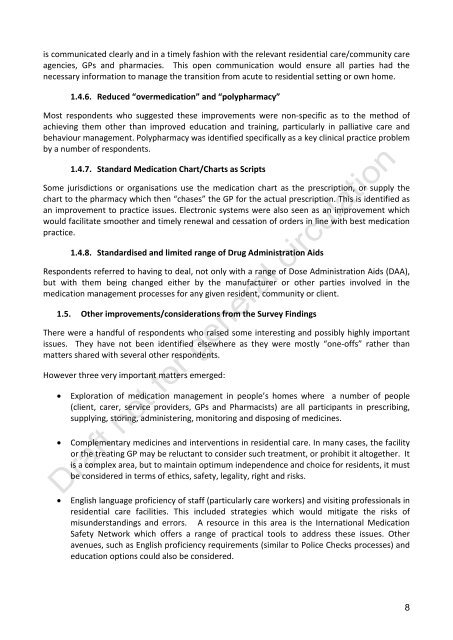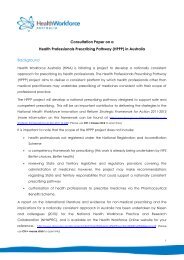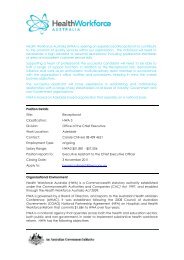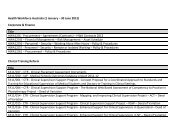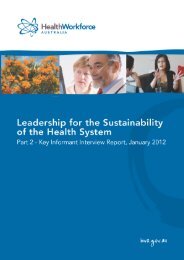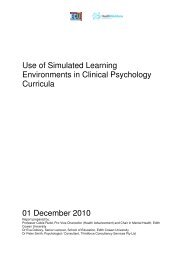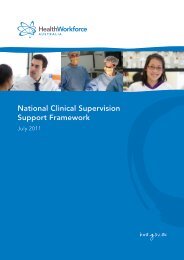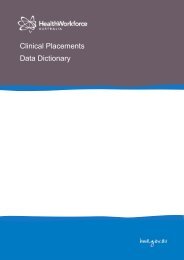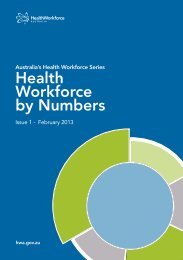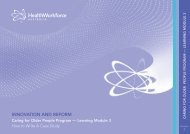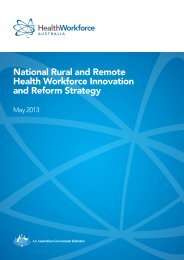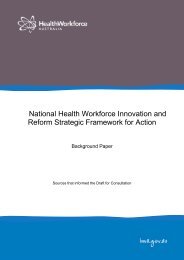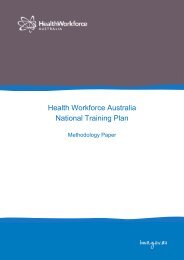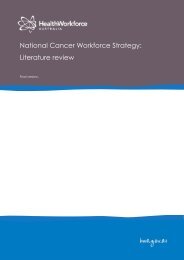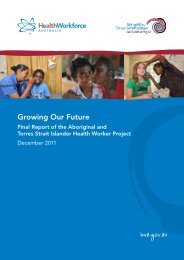SUMMARY - Safe Medications Management project: Key issues and ...
SUMMARY - Safe Medications Management project: Key issues and ...
SUMMARY - Safe Medications Management project: Key issues and ...
You also want an ePaper? Increase the reach of your titles
YUMPU automatically turns print PDFs into web optimized ePapers that Google loves.
is communicated clearly <strong>and</strong> in a timely fashion with the relevant residential care/community careagencies, GPs <strong>and</strong> pharmacies. This open communication would ensure all parties had thenecessary information to manage the transition from acute to residential setting or own home.1.4.6. Reduced “overmedication” <strong>and</strong> “polypharmacy”Most respondents who suggested these improvements were non-specific as to the method ofachieving them other than improved education <strong>and</strong> training, particularly in palliative care <strong>and</strong>behaviour management. Polypharmacy was identified specifically as a key clinical practice problemby a number of respondents.1.4.7. St<strong>and</strong>ard Medication Chart/Charts as ScriptsSome jurisdictions or organisations use the medication chart as the prescription, or supply thechart to the pharmacy which then “chases” the GP for the actual prescription. This is identified asan improvement to practice <strong>issues</strong>. Electronic systems were also seen as an improvement whichwould facilitate smoother <strong>and</strong> timely renewal <strong>and</strong> cessation of orders in line with best medicationpractice.1.4.8. St<strong>and</strong>ardised <strong>and</strong> limited range of Drug Administration AidsRespondents referred to having to deal, not only with a range of Dose Administration Aids (DAA),but with them being changed either by the manufacturer or other parties involved in themedication management processes for any given resident, community or client.1.5. Other improvements/considerations from the Survey FindingsThere were a h<strong>and</strong>ful of respondents who raised some interesting <strong>and</strong> possibly highly important<strong>issues</strong>. They have not been identified elsewhere as they were mostly “one-offs” rather thanmatters shared with several other respondents.However three very important matters emerged:Exploration of medication management in people’s homes where a number of people(client, carer, service providers, GPs <strong>and</strong> Pharmacists) are all participants in prescribing,supplying, storing, administering, monitoring <strong>and</strong> disposing of medicines.Complementary medicines <strong>and</strong> interventions in residential care. In many cases, the facilityor the treating GP may be reluctant to consider such treatment, or prohibit it altogether. Itis a complex area, but to maintain optimum independence <strong>and</strong> choice for residents, it mustbe considered in terms of ethics, safety, legality, right <strong>and</strong> risks.English language proficiency of staff (particularly care workers) <strong>and</strong> visiting professionals inresidential care facilities. This included strategies which would mitigate the risks ofmisunderst<strong>and</strong>ings <strong>and</strong> errors. A resource in this area is the International Medication<strong>Safe</strong>ty Network which offers a range of practical tools to address these <strong>issues</strong>. Otheravenues, such as English proficiency requirements (similar to Police Checks processes) <strong>and</strong>education options could also be considered.8


